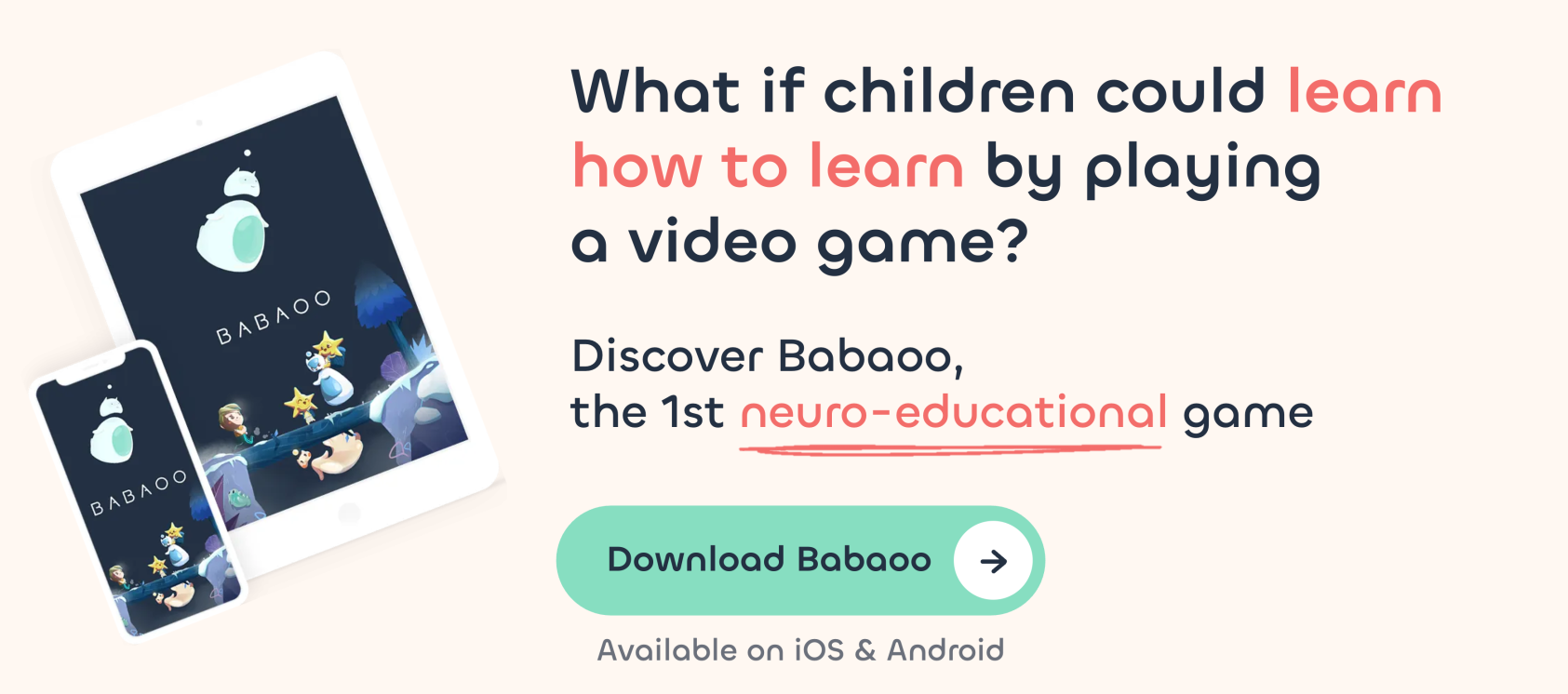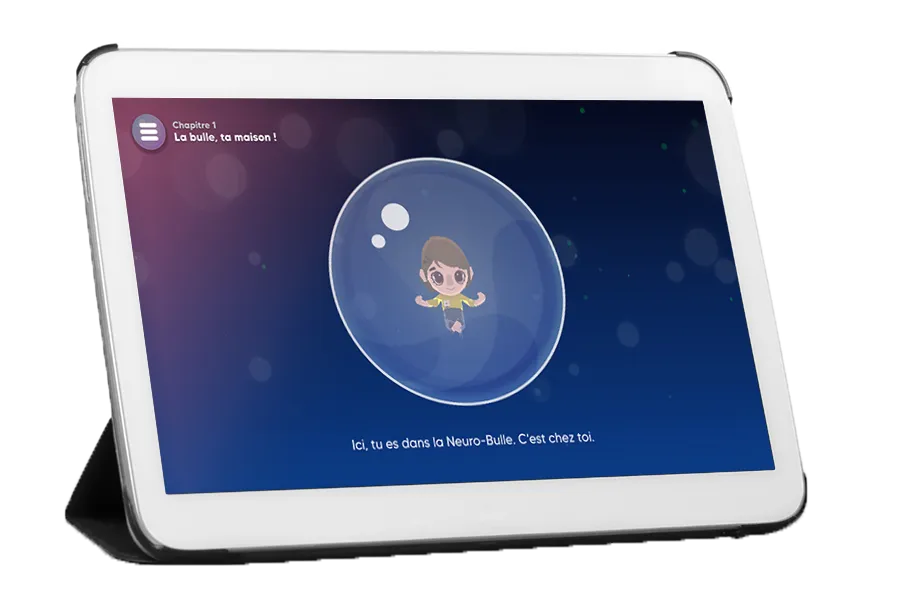The adventure of learning
Attention, Inhibitory Control, Working Memory, Flexibility and Planning. These Essential Executive Functions play a crucial role, similar to that of a conductor guiding the symphony of our daily actions. They enable us to perform a multitude of activities, such as talking, dancing, cooking and playing sports, to a score whose notes we begin to read at an early age.
Deeply rooted in our brains, these fascinating mechanisms drive cognitive functions that are fundamental not only to our personal development, but also to the education and fulfillment of our children.
From the very first moments of life, our little adventurers embark on an extraordinary journey of exploration and discovery. They develop key skills, first learning to feed themselves, to communicate by sign and then orally. Their journey also leads them to master concepts they use every day: manners, social rules, mathematics, and much more.
And it’s here, in the part of the brain just behind the forehead known as the “prefrontal cortex”, that the amazing epic of learning begins! 🧠
Babaoo’Tip 💡
- As early as kindergarten, certain activities promote the development of Executive Functions, although this is not always spelled out as such in school curricula. For example, games such as “Neither Yes, Nor No” or “Simon says“, which involve thinking about controlling one’s gestures and words before acting, or the use of a “talking stick” which aims to teach them to respect their turn to speak directly stimulate Inhibitory Control in our dear children!
Understanding Inhibitory Control: the key to self-control
But what exactly is Inhibitory Control? Imagine your child walking along a path in the forest. He/she is following the path and enjoying nature, when suddenly a huge hole prevents him/her from continuing forward. Inhibitory control is the Executive Function that will enable her to say to herself “STOP: I think, then I act.” How do I get past this hole and continue my stroll? 🤷
By helping her regulate her impulsivity, your child learns to resist certain automatisms. In other words, he/she will use the little voice in his/her head to understand what self-control, self-mastery and perseverance are all about. Maybe he’ll decide to bypass the obstacle, retrace his steps to take another path, or come up with the idea of imitating Tarzan with a vine… Who knows! 🌴
By developing his Inhibitory Control skills, your child learns, for example, to focus on a single task at a time for extended periods. As he grows older, he’ll be able to better manage distractions and stay focused on his goals. He also learns not to give an answer too quickly, at the risk of making a mistake, and therefore to take the time to be sure of his answer before giving it.
In essence, Inhibitory Control makes your child a little strategist capable of turning challenges into opportunities to learn and act appropriately. 💡
Inhibitory Control also plays a role as an emotional regulator
The Inhibitory Control is not only paramount when it comes to persevering or concentrating. It also plays a crucial role in the development of socio-emotional skills. Indeed, to understand the emotions of others (this is what we call Theory of Mind), your child needs to be able to detach himself from his own emotions! He’ll have to inhibit his own understanding of the world and put himself in the other person’s shoes to understand what he’s feeling. He’ll then be able to understand why his friend Max didn’t react the way he did to an unexpected situation!
Inhibitory Control will also enable your child to develop another aspect of social-emotional skills, called Social Information Processing: this is what enables him/her to react appropriately to different situations experienced in society, taking into account cues from the environment. The child will assimilate that in class, he must raise his finger before speaking 🙋and, depending on the context, that shouting for joy is not always acceptable (in a place where calm is required, for example). 🔇
Inhibitory Control and “self-control”: factors in social success
You’re probably familiar with the Marshmallow test, which involves leaving a child alone in front of a sweet with the promise of a second one if they don’t eat the first in x minutes? This experiment has shown that young children are not always able to restrain themselves from eating the candy. And this despite the promise of a double reward.
This experiment (Moffitt, T. E., Arseneault, L., Belsky, D., Dickson, N., Hancox, R. J., Harrington, H., … & Caspi, A. (2011). A gradient of childhood self-control predicts health, wealth, and public safety. Proceedings of the national Academy of Sciences, 108(7), 2693-2698.) emphasizes that willpower and “self-control” are not innate factors, but are acquired as children grow up. Even more implicating, the children in this study who have managed to control their impulses tend to be more successful in adulthood: they get better grades at school, access jobs more easily and manage their budgets more effectively. Their ability to control themselves even protects them more from potential health problems. Inhibitory Control and self-control are therefore not just assets for early childhood, but solid foundations for building a fulfilling and successful adult life. 😊
✏ Note: the most recent theoretical model dealing with Executive Functions is that of Adele Diamond, Professor of Neuroscience at the University of British Columbia, published in 2013 (Diamond, A. (2013). Executive functions. Annual review of psychology, 64, 135-168.). In it, she emphasizes the chronological order of appearance of the Executive Functions. Thus, Attention, Inhibitory Control and Working Memory are all accompanied by skills, developing gradually between infancy and early adulthood. Gradually, children learn to interact better with their environment, adjusting their behavior and adapting to the situation they face by regulating their impulsivity.

Discover Inhibitory Control with Babaoo!
In the Brain-World universe in which the player evolves, it’s through the World of Inhibitory Control that the adventure begins. Quickly, by chatting with the endearing character Inhi, Guardian of Inhibitory Control, the little player will understand what Inhibitory Control is and why it’s useful to him on a daily basis.
The World of Inhibitory Control is divided into two regions, Gesta and Cognitia, which work on the proper functioning of Motor Control and Cognitive Control. The Babaoo Inhi and Astrocytes, accompany the player in decoding how his Brain works 🧠
To achieve this, your budding explorer will follow an interactive path through several Neurons, within which he’ll have to work on various skills, for example:
- Precision, aimed at honing his skill 🎯
- Coordination, to perform gestures in the right order ⚙️
- Stop and Go, which is the ability to stop and think before acting 🚦
In the Babaoo universe, it’s through a series of captivating quests and challenges that these Inhibitory Control skills are not only highlighted but also practiced, allowing your child to understand the importance of this Executive Function in a variety of situations.
➡️ Discover the world of Babaoo
The Babaoo recap
Inhibitory Control is the little voice in your head that reminds you to think before you act. This Executive Function helps resist temptations, ranging from those that seize your child at the sight of a piece of candy, to the more rational ones, reminding him to look left and right before crossing at the crosswalk. 🍭
Inhibitory embodies the art of self-control, perseverance and emotional control. These abilities are invaluable because they enable both you and your child to focus on a task or activity while ignoring distractions. 🎵





